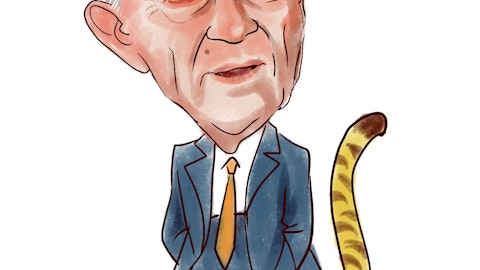
Several of Mr. Robertson’s trading mentees, nicknamed the Tiger Cubs, have also been buying shares of the troubled company. John Griffin at Blue Ridge Capital and Philippe Laffont at Coatue Management each owned a $272 million and $144 million stake respectively. Technology investor and another Tiger Cub John Thaler of JAT Capital Management increased his position size by 48% in the 1st quarter of 2012. He owns over 1.1 million shares valued at $129 million.
In addition, company insiders and other hedge funds have been building positions in Netflix. Billionaire Steven Cohen significantly boosted his stake in the company (see Cohen’s top stock picks), whereas David E. Shaw and Ken Griffin made bullish bets via call options. Passport Capital’s John Burbank has been bearish about the market for a while and he initiated a large put position in Netflix. Netflix’s insiders have been making very profitable transactions for a while now. Last year when the stock price was above $200 several insiders have been exercising their options and selling them into the market. There were also light insider sales when Netflix was between $100 and $200 (see the list of insider sales in Netflix). The interesting thing is that there hasn’t been a single insider sale over the past two years when Netflix was trading below $100. In fact, over the past three months there were two insiders purchasing the stock. The biggest insider purchase occurred at around $72 where Jay Hoag spent $25 million on Netflix shares (see the details here). So far he made more than 10% in less than three months.
Netflix limped through a dismal 2011. After peeking at over $300 last year, Netflix shares tumbled 80% due to several strategic blunders. The company announced a 60% subscription price hike resulting in a customer revolt and a mass cancellation of subscriptions. Netflix also stumbled with a failed spin off of the company’s mail-order DVD business. CEO Reed Hastings later backed out of the deal, but his credibility has taken a hit both with customers and Wall Street.
Recent financial results are showing signs of a turnaround. For Q1, Netflix reported a loss of $4.6 million, or $0.08/share; however, year-over-year revenue increased 21%, up from $718.6 million in Q1 2011, to $869.8 million. Netflix also reported that its subscribers streamed an eye-popping 1 billion hours of video last month for the first time in the company’s history.
Analysts are optimistic that the company has turned the corner. Andy Hargreaves, an analyst with Pacific Crest Securities in Portland, Oregon, gave Netflix an outperform rating and raised his target price on the stock to $130/share. “They are the clear leader in their space and still have growth opportunities.” Mr. Hargreaves said in a conference call following the quarterly report. “We had estimated their customers watched about 850 million hours per month in June, and they exceeded that. People are watching more and there are more people watching.”
Investors are optimistic that Netflix is well-positioned to benefit from the exponential global growth of streaming video and that the company is only in the early stages of its international expansion story.
However, some analysts remain skeptical on Netflix’s prospects. In a research report published by Valuentum Securities, analysts warned that the increasing costs for content-licensing and growing competition threaten Netflix’s profitability. “We’d stay away from Netflix because the rising costs of content and fierce competition from Apple (NASDAQ:AAPL) could really impair profitable growth.”
Netflix critics believe that the company will struggle to remain profitable due to increased competition. Deep pocketed rivals such as Apple, Amazon (NASDAQ:AMZN), Wal-Mart (NYSE:WMT) and Coinstar (NASDAQ:CSTR) are beginning to make inroads into streaming video space. However, heavy hedge fund and insider buying suggests the smart money isn’t concerned about these problems. The steep decline in NFLX shares price over the past year may be an excellent opportunity to buy alongside the Wall Street whales.
As the company navigates its recent brand missteps, we think NFLX is well-positioned to benefit from exponential growth in the streaming video space. While rising content costs and increased competition are certainly a concern, improved economies of scale should sustain margins. The company’s return to profitability, expected in the third quarter of this year, and its international growth story should provide a catalyst for higher share prices.





